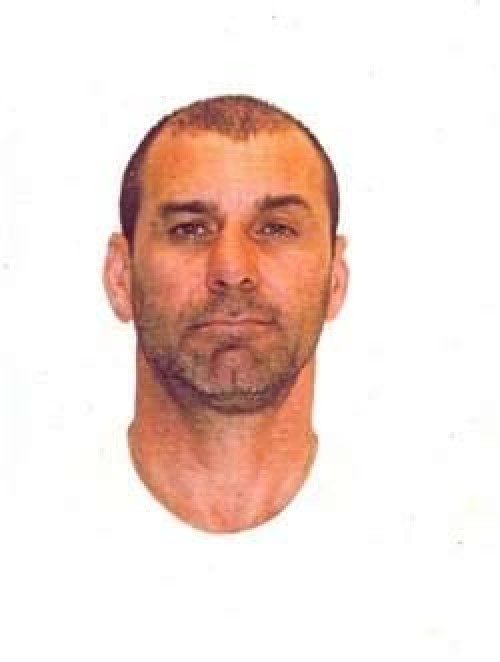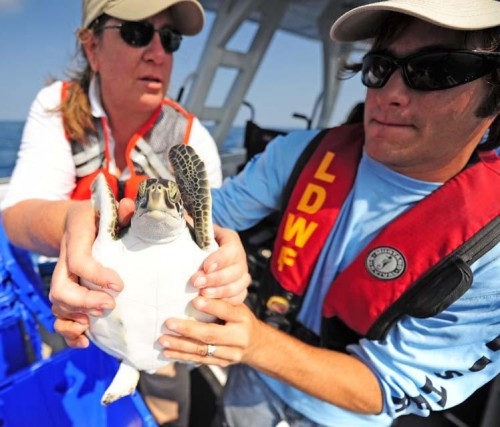"Requiem for All Saints and All Souls" (Houma)
November 2, 2010
Karl Frazier
November 4, 2010“The governor sent me down here to wish you a happy birthday, Karen,” teased Louisiana Department of Wildlife and Fisheries Secretary Robert Barham as he opened his presentation to the Houma-Terrebonne Chamber of Commerce last Tuesday.
The state official’s jovial comment was one of many happy birthday wishes to chamber member Karen Schilling, the frequency of which became a running joke during the noon general membership meeting at the Plantation Inn.
Barham could spin a humorous tale with the best of them, but when it came to the core of his message he was nothing but serious.
“BP is quite a piece of work,” Barham said as he set the stage voicing his concern that coastal cleanup efforts are not progressing to his satisfaction following the April 20 Deepwater Horizon explosion and oil spill.
“I wish I could tell you it is easy to deal with them, [but] it’s not. They have gone into the mode of … deny, delay and defer,” he said.
“I talk to them almost every day. We just want them to do what they are advertising in their commercials,” the LDWF secretary said. “They say, ‘We’re here for the long pull. We’re going to make it right.’ If they would just do what they say in their commercial, that is all we ask of them.”
Barham reminded listeners that Louisiana is the fisheries breadbasket of America. “This is where it occurs,” he said.
It was noted that Louisiana and Alaska combined provide half of the seafood consumed in the nation. Louisiana alone produces one-third of the total seafood product consumed in the United States.
“We are number one in crab production, number one in oyster production and number one in shrimp production,” Barham said.
The public relations efforts made by BP for their own gains, Barham said, should be placed on Louisiana seafood products to help restore consumer confidence in domestic products and make them the selection choice over imported goods.
“[The seafood industry] is not just about economics, it is about culture. It is what Louisiana is,” he said.
During his presentation, Barham charged that BP claims the water is clean and the event is over. “But all you have to do is look at Alaska’s experience [following the oil spill of the Exxon Valdez].”
He cautioned that he was not making a prediction regarding oil leftovers and any impact on Louisiana seafood, but offered thoughtful consideration concerning future harvests.
“When the Valdez incident occurred in Prince Williams Sound they went for three years and then the herring fisheries collapsed in Prince William sound. And 22 years later you can chart how the number of salmon continues to decline. [Alaskan officials] believe it is the eggs in contact with residual oil in the system,” he said.
“What we are going to have to guard against in Louisiana is that we are seeing something unexpected and unknown to us. From the very beginning we opposed BP on the use of sub-sea dispersants. If it’s on the surface it degrades much faster if it is in the presence of heat and light. Never in the world had sub-sea dispersants been used at this depth – over a billion gallons of dispersant was used,” Burham said.
The wildlife and fisheries expert revealed that dispersants used to break up underwater oil in the Gulf of Mexico had been injected into a methane-rich plume. The methane then separated from the oil when it rose to the surface. The result was a change in the dynamics of what was trying to be achieved.
On the surface, Barham said, wind currents can easily separate oil. But the complex channels of the sub-sea environment can trap oil in areas where it might not be revealed for up to 300 years.
“That dispersant is still out there in the water column and will be for a long time,” he said.
Barham identified the Louisiana coast as having a very complex food chain, which could be impacted in years to come.
Current shrimp production is down 60 percent compared to a four-year average. The crab harvest is down 40 percent as is the level of oyster production.
On the other hand, Barham said wildlife conditions are better than he would have predicted six months ago.
“We have returned over 1,100 birds back into the environment, cleaned up and healthy,” he said. “This week, our agents released 34 sea turtles back to the wild.”
Barham announced three projects, which he said were significant in replenishing wildlife and fishery activity in the state. He said that one of the things they did get BP to agree to was a $13 million, 3-year study on fishery impacts.
The state has also tentatively agreed with BP to build a saltwater fish hatchery as part of a new state marine lab in Grand Isle. “There’s only one other in the Gulf,” he said.
A $173 million marketing and seafood safety program proposal has not been one to reach a point of agreement between the state and BP.
Barham warned that any gains from federal fines against BP for Louisiana could come down to a political battle. “There are differing impacts and there is going to be a fight. Heck, Texas gets three tar balls and wants the same amount as Louisiana,” he said.
Telephone messages requesting BP’s response to Barham’s comments were not returned.
“Those guys are fighting a real battle,” said chamber member Carroll Dugas regarding the Department of Wildlife and Fisheries.
Dugas and other chamber members are among the many who can only hope cleanup and restoration progress is made between state officials and BP. Maybe that way next year at this time Karen Schilling will have an even better birthday.
Dr. Cara Field (left), from the Audubon Nature Institute in New Orleans, and Matt Boasso, a Louisiana Department of Wildlife and Fisheries, prepare to release a sea turtle 50-miles south of Grand Isle, Oct. 21. PETTY OFFICER 2ND CLASS ROB SIMPSON










